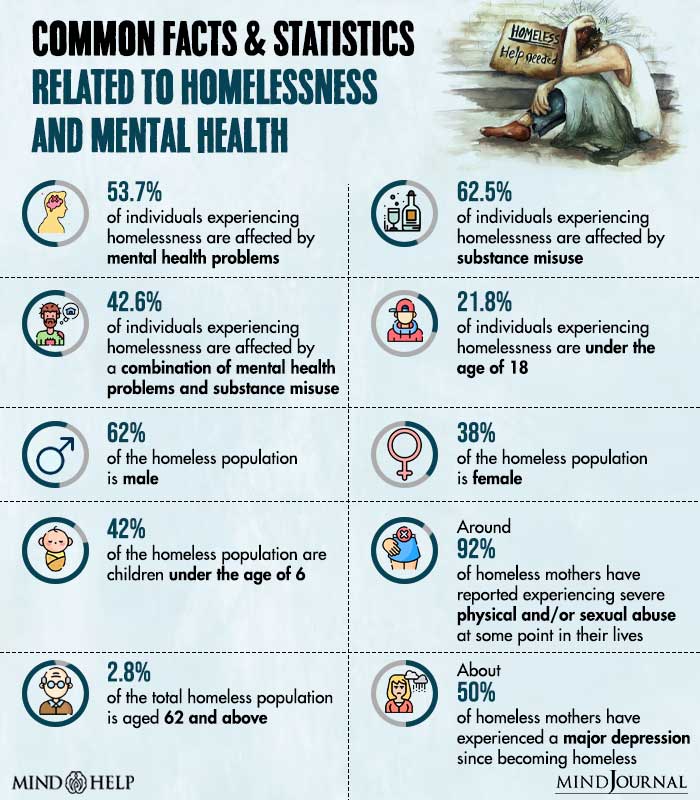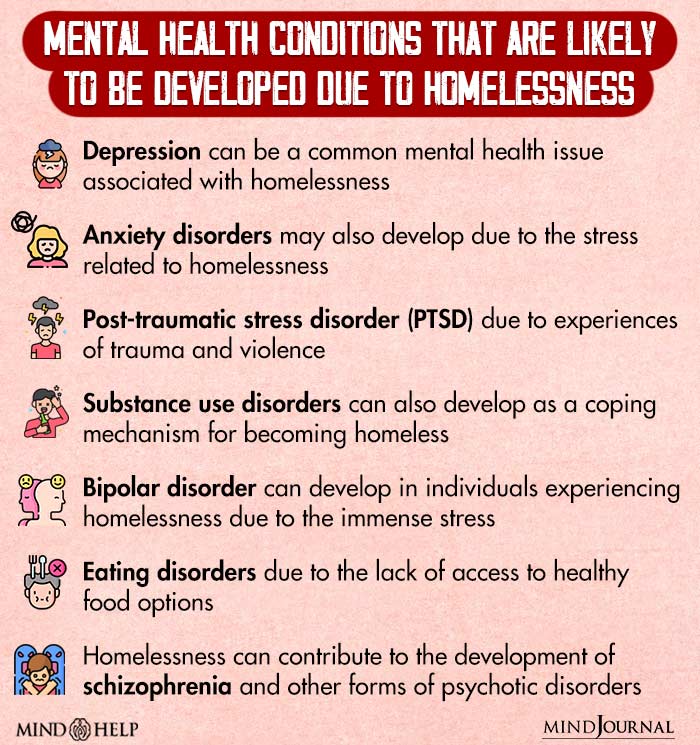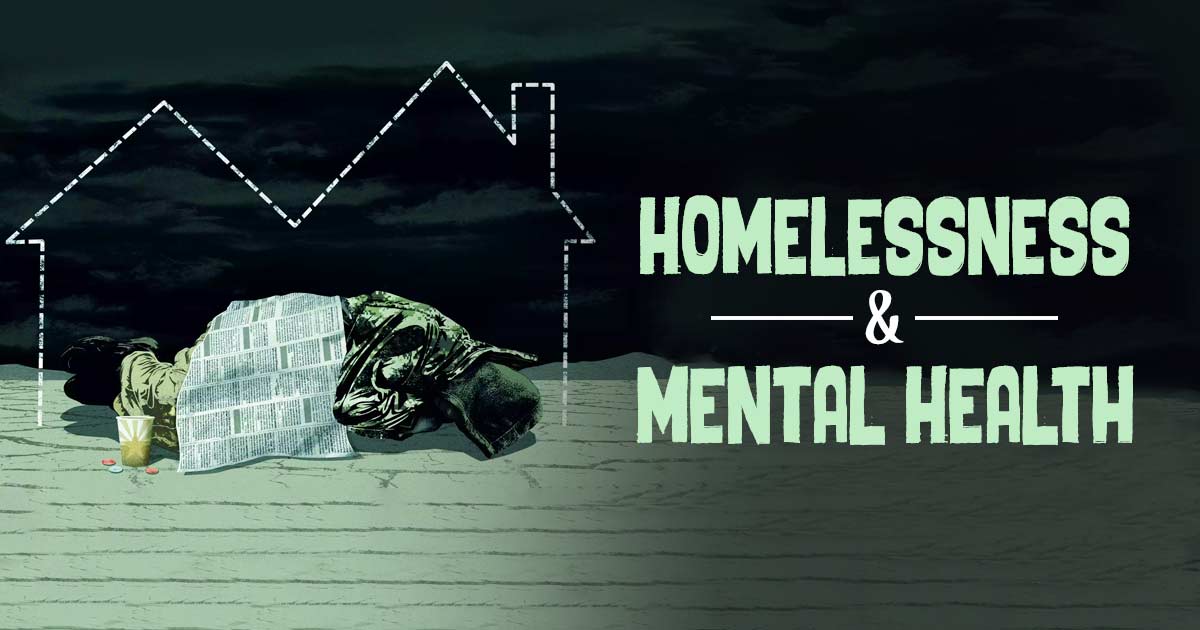Homelessness and mental health are strongly interconnected, with individuals experiencing homelessness being at a higher risk of developing mental health issues and those with mental health issues being more vulnerable to becoming homeless. Addressing the root causes of homelessness and providing adequate mental health support are crucial steps towards breaking this cycle.
The Link Between Homelessness and Mental Health
The correlation between homelessness and mental illness is a complex 1 Gutwinski, S., Schreiter, S., Deutscher, K., & Fazel, S. (2021). The prevalence of mental disorders among homeless people in high-income countries: An updated systematic review and meta-regression analysis. PLoS medicine, 18(8), e1003750. https://doi.org/10.1371/journal.pmed.1003750 and reciprocal relationship that is widely acknowledged by researchers. Homelessness refers to 2 Sleet, D. A., & Francescutti, L. H. (2021). Homelessness and Public Health: A Focus on Strategies and Solutions. International journal of environmental research and public health, 18(21), 11660. https://doi.org/10.3390/ijerph182111660 the state of not having a stable, safe, and permanent place to live, while mental health refers to an individual’s emotional, psychological, and social well-being.
The symptoms associated with mental illness can impede an individual’s ability to maintain a steady income and carry out daily tasks that promote stable housing, while poverty and insufficient low-income housing have been found to be primary contributors to homelessness in those with mental illnesses.
This intersection of mental illness and homelessness can also result in additional factors, including higher levels of substance abuse and violent victimization, further reinforcing the relationship between these two issues.

How Do People Become Homeless?
Here are some common reasons 3 Sleet, D. A., & Francescutti, L. H. (2021). Homelessness and Public Health: A Focus on Strategies and Solutions. International journal of environmental research and public health, 18(21), 11660. https://doi.org/10.3390/ijerph182111660 why people become homeless:
- Economic factors, such as job loss, low wages, or poverty, can make it difficult for individuals to afford housing and basic necessities, leading to homelessness.
- A lack of affordable housing options, especially in urban areas, can make it difficult for individuals to secure stable housing.
- Domestic violence can force individuals to leave their homes and become homeless.
- Mental health issues, such as psychosis, depression, anxiety, and PTSD, can make it difficult for individuals to 4 Vostanis, P., Grattan, E., & Cumella, S. (1998). Mental health problems of homeless children and families: longitudinal study. BMJ (Clinical research ed.), 316(7135), 899–902. https://doi.org/10.1136/bmj.316.7135.899 maintain stable housing and employment.
- Substance abuse and addiction can lead to job loss, financial difficulties, and strained relationships, which can contribute to homelessness.
- Family breakdown, such as divorce, family conflict, or aging out of foster care, can lead to homelessness for young people.
- Natural disasters, such as hurricanes, floods, or wildfires, can displace individuals and cause them to become homeless.
Read More About depression Here
Factors Affecting Homelessness and Mental Illness
Several factors can contribute 5 Mago, V. K., Morden, H. K., Fritz, C., Wu, T., Namazi, S., Geranmayeh, P., Chattopadhyay, R., & Dabbaghian, V. (2013). Analyzing the impact of social factors on homelessness: a fuzzy cognitive map approach. BMC medical informatics and decision making, 13, 94. https://doi.org/10.1186/1472-6947-13-94 to homeless and mental illness, including:
- People with mental illness may face stigma and discrimination in employment, housing, and social settings, which can make it difficult for them to access the resources they need to maintain stable housing.
- Limited access to mental health services, including counseling, therapy, and medication management, can make it difficult for people with mental illness to manage their symptoms and maintain stable housing.
- People with mental illness may have limited support networks, which can make it difficult for them to find stable housing or access resources to manage their symptoms.
Read More About therapy Here
How does Homelessness Affect Mental Health
The psychological effects of homelessness 6 Padgett D. K. (2020). Homelessness, housing instability and mental health: making the connections. BJPsych bulletin, 44(5), 197–201. https://doi.org/10.1192/bjb.2020.49 involve:
- Homelessness is associated with high levels of stress, including worries about where to find food, shelter, and safety.
- Homelessness can be a traumatic experience, particularly if individuals have experienced violence or abuse on the streets.
- Homelessness can be a socially isolating experience, as individuals may lack social support networks and be forced to spend long periods alone.
- Homelessness can lead to a loss of identity and purpose, causing symptoms of depression such as feelings of hopelessness and helplessness due to a lack of stable employment or housing.
- Homeless individuals often lack a private space where they can retreat and feel safe, which can contribute to feelings of anxiety and vulnerability.
- Homelessness can present significant challenges to maintaining basic hygiene, which can have adverse effects on physical health and worsen existing mental health conditions.
- Homelessness can drive individuals to use drugs 7 Doran, K. M., Rahai, N., McCormack, R. P., Milian, J., Shelley, D., Rotrosen, J., & Gelberg, L. (2018). Substance use and homelessness among emergency department patients. Drug and alcohol dependence, 188, 328–333. https://doi.org/10.1016/j.drugalcdep.2018.04.021 or alcohol as a means of coping with stress and trauma, which can trigger a cycle of addiction.
- Chronic homelessness can cause psychotic symptoms 8 Spranger Forte, A., Bento, A., & Gama Marques, J. (2023). Schizoaffective disorder in homeless patients: A systematic review. The International journal of social psychiatry, 69(2), 243–252. https://doi.org/10.1177/00207640221131247 such as hallucinations, delusions, and catatonia, which hinder individuals from accessing the necessary care and support for recovery.
Read More About Stress Here

Treatment and Rehabilitation for Mental Illness and Homelessness
There are several effective 9 Institute of Medicine (US) Committee on Health Care for Homeless People. (2010). Summary and Recommendations. Nih.gov; National Academies Press (US). Available from: https://www.ncbi.nlm.nih.gov/books/NBK218243/ treatment measures for homeless and mental illness:
- The first step is to conduct a comprehensive assessment of their mental health status, substance use, and medical needs.
- Once the assessment is complete, the focus is on stabilizing the individual’s mental health and medical needs through medication, therapy, and other treatments.
- Providing stable and safe housing is crucial for the rehabilitation of mentally ill homeless people. Psychiatric shelters offer a safe and supportive environment where individuals can receive treatment and begin to rebuild their lives.
- In addition to housing, supportive services such as case management, counseling, and vocational training are important for helping the psychological effects of homelessness to regain their independence and become self-sufficient.
- Ongoing support and follow-up care are essential for ensuring the long-term success of mental health conditions. This includes monitoring medication use, providing counseling and therapy, and addressing any relapses or setbacks.
How To Deal with Mentally Ill Homeless People?
Here are some tips 10 US), M. (2017). Health Care Services for Homeless People. Nih.gov; National Academies Press (US). Available from: https://www.ncbi.nlm.nih.gov/books/NBK218235/ for dealing with mentally ill homeless people:
- Offer help and support in a non-judgmental way, such as providing food, clothing, or information on local resources and services.
- Respect the individual’s boundaries and avoid making assumptions or judgments about their situation.
- Involve trained professionals such as mental health workers, social workers, or emergency services.
- You can help homeless mentally ill people by providing them with access to mental health services, including counseling, therapy, and medication management.
- It may take time to build trust and rapport with mentally ill homeless people, so be patient and persistent in your efforts to help.
- Listening actively to homeless mentally ill people can help them feel validated and understood.
Takeaway
Homeless mentally ill individuals need compassionate care and support to help them rebuild their lives and reintegrate into society. Addressing the root causes of homelessness and mental illness, as well as providing effective treatment and rehabilitation measures, can help break the cycle of homelessness and improve the mental health outcomes of this vulnerable population.
At A Glance
- Homelessness can be both a cause and a result of mental illness.
- Mental illness can contribute to a person becoming homeless by impairing their ability to work, maintain relationships, and take care of themselves.
- Homelessness can exacerbate mental illness by exposing people to trauma, violence, and substance abuse.
- Homeless mentally ill individuals require access to mental health services and stable housing.
- Rehabilitation of homeless mentally ill people requires a comprehensive assessment of their mental health status.
- Providing stable and safe housing is crucial for the rehabilitation of mentally ill homeless people.
- Ongoing support and follow-up care are essential for ensuring the long-term success of the rehabilitation process.
Frequently Asked Questions (FAQs)
1. How can I help homeless individuals with mental health conditions?
You can help by supporting organizations that provide housing and mental health services for homeless individuals, volunteering at homeless shelters or mental health clinics, and advocating for policy changes that address homelessness and mental health issues. Additionally, it is important to treat homeless individuals with compassion and understanding and to avoid stigmatizing or discriminating against them based on their housing status or mental health condition.
2. Can homelessness cause mental illness?
Yes, homelessness can cause mental illness. The stress and trauma of being homeless, coupled with the lack of access to basic needs like food, shelter, and medical care, can lead to the development of mental health conditions.
3. How common is mental illness among homeless individuals?
Mental illness is highly prevalent among homeless individuals. Studies have shown that the rates of mental illness, including serious mental illnesses such as schizophrenia, bipolar disorder, and major depression, are much higher among homeless individuals than the general population.















